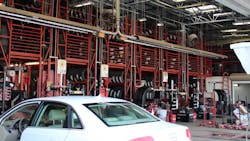Most single independent tire stores have one thing in common: the owner can usually be found behind the counter. This means owner “stuff” isn’t getting done during the workday. That means the owner is working late nights or at the kitchen table on Sunday afternoon.
If you are an owner of a single location, you have to learn how to get off the counter. If you don’t, all you did was buy yourself a job.
I’m not saying you can’t fill in when someone calls in sick or someone quits. Emergencies happen. But the minute you’re back behind the counter, you should be figuring out how to get off of it. There are many reasons why.
An owner should be doing owner activities, such as researching and negotiating better rates on insurances and fees, lowering fixed costs, managing payroll and planning future events. The list certainly doesn’t end there, but these activities add up to a full-time job.
When a dealer opens up a second shop, he or she can usually figure out, somehow, to be in two places at once. But when the owner opens up a third shop? That’s when the entrepreneur must learn a new skill: managing from a distance. And this is a skill that even a single store operator needs to develop.
Managing from a distance is a broad term for many skills. We will focus on the top three. When you have to manage people without seeing them work every day, you have to build trust with your management team, depend on systems and processes and finally refuse to jump in.
Building trust with your management team means bringing in store managers and handing over the reins so they can run the store. You will retain some veto power. Most noticeably, you will want to keep the power to fire anyone. There are many legal reasons for this and even safety reasons.
You will also likely retain control of any budget or expense spending. But moving forward, these items must become discussions, not authoritative solo decisions.
If a manager wants to fire an employee, he or she must talk to you first and explain, document and justify. If a manager wants to spend X amount of money on new equipment, he or she must research, gather the resources and convince you. And you have to allow it. Do not make this a futile practice for managers.
To build trust, their opinions and judgements must be taken seriously and acted upon. If you are thinking to yourself “I can’t trust my manager with the knowledge of people’s pay or in making equipment decisions” then you either have the wrong person in charge or you need to start training them on how to make those decisions and keep information confidential.
Depending on systems and processes means that the store is forged in a robust, well-thought-out series of steps and decision-making. A system is a series of locked-in, predetermined steps that never change. Greet the customer. Obtain and verify contact information and timeline. Thank the customer for business.
Processes usually involve making little decisions or judgements that help achieve a desired outcome. How to make those little decisions needs to be taught. Have employees think through the little decisions, which are teachable, and if they make the easy decisions the way you would, that will add up to the big decisions.
There has to be an element of independent thought with managers when you run multiple locations. If there isn’t, you will be inundated with low-level, task-oriented questions and your entire day will be interrupted with questions like “Should I order the washer fluid?” You do not want to be the center hub for everyone’s answers.
And keep an eye on the “superheroes” on your team. Superheroes don’t like rules. While you may tend to like their heroic efforts and usually large sales production, they will feel constrained by the rules and become unhappy or they will start breaking rules. This will encourage others to break the rules. You want to avoid this situation.
Finally, refuse to jump in. Probably the number one mistake managers from a distance make is giving in to the temptation of jumping back in, taking over and doing the work themselves. I’m not talking about intervening in the event of a severe crisis or covering the occasional shift. I’m talking about situations where a problem is observed and the owner knows he is the smartest/fastest/best person to handle the issue, so that’s what he does.
You must refuse to jump in. Turn to your managers and ask what they are going to do about it. Coach them in making the best decision possible.
About the Author

Dennis McCarron
Dennis McCarron is a partner at Cardinal Brokers Inc., one of the leading brokers in the tire and automotive industry (www.cardinalbrokers.com.) To contact McCarron, email him at [email protected].
